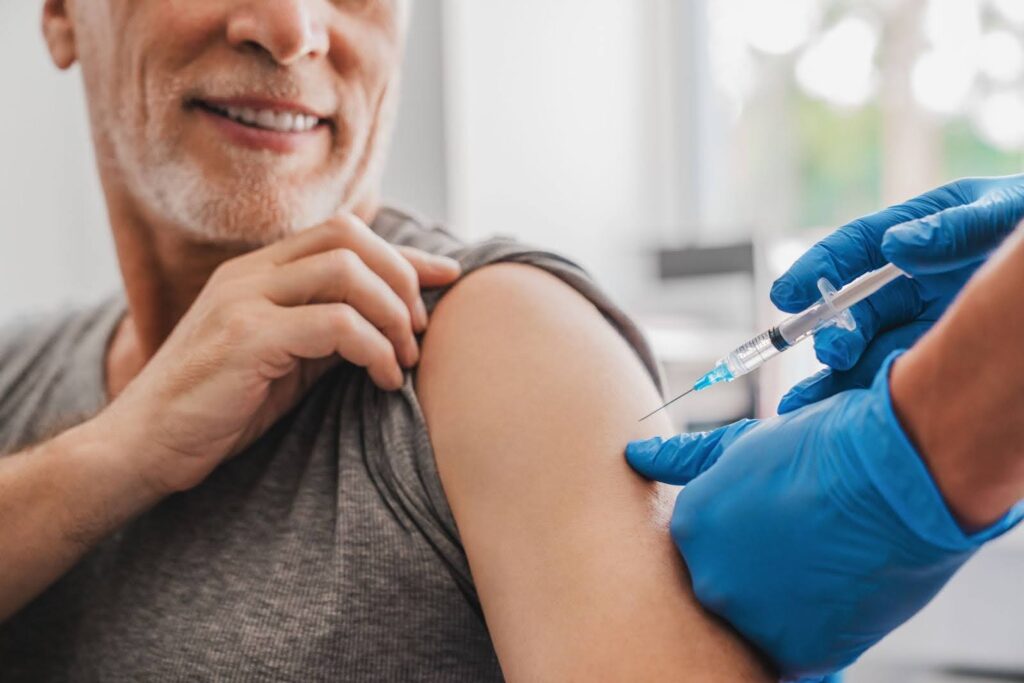Heart health in men is currently the worst it’s ever been, with nearly 1 in 5 deaths attributed to heart disease annually (CDC). As more men turn to testosterone therapy to address their health concerns, awareness of how it impacts heart health allows more men to make the educated decisions necessary for peak well-being.
Introduction to Testosterone and Heart Health
One person dies every 33 seconds from heart disease. Nearly 1 million people will have a heart attack this year in the United States alone, and for many, it will not be their first (CDC). Cardiovascular disease is the number one leading cause of death worldwide, but what role does testosterone play in these figures?
Testosterone is the primary sex hormone responsible for healthy red blood cell production, bone density, muscle mass maintenance, and overall male well-being (Cleveland Clinic). Abnormal levels of this fundamental hormone, known as low T or hypogonadism, contribute to a host of health concerns in men, including:
- Low sex drive and erectile dysfunction
- Loss of body hair
- Reduced muscle mass
- Osteoporosis and decreased bone density
- Difficulty concentrating and poor memory
- Increased rates of cardiac incidents, including heart attack and stroke
Overall quality of life diminishes significantly when men (and women) experience the symptoms of low testosterone. In recent research, evidence shows that low T levels increased rates of coronary artery disease (CAD), metabolic syndrome, and even type 2 diabetes (National Library of Medicine).
Despite the growing body of research, the relationship between testosterone and heart health remains complex. Testosterone replacement therapy is a topic of interest for men with low testosterone levels, and for many, it could mean reducing their risk of cardiovascular events.
Cardiovascular Risk Factors and Maintaining a Healthy Heart
Specific factors elevate your cardiovascular risk, and awareness is the first step toward protecting your heart health. While genetics does play a role, many cardiovascular risk factors are within your control, and you can improve them through lifestyle changes and proper medical management.

Here are several of the most common risk factors that increase heart attack and stroke rates (CDC):
- High blood pressure: Often called the “silent killer,” hypertension forces your heart to work harder and damages arterial walls over time.
- High cholesterol levels: Low high-density lipoprotein (HDL) and elevated LDL cholesterol can lead to arterial blockages.
- Smoking and tobacco use: Dramatically increases cardiovascular events by damaging blood vessels and reducing oxygen delivery.
- Obesity and metabolic syndrome: Excess weight strains the cardiovascular system and often accompanies insulin resistance.
- Type 2 diabetes: Elevated blood sugar levels damage blood vessels and increase the risk of myocardial infarction.
- Sedentary lifestyle: Lack of regular physical activity weakens the heart muscle and worsens other risk factors.
- Chronic stress: Prolonged stress hormones can contribute to inflammation and cardiovascular disease progression.
- Age-related declines: Natural aging processes, including decreased testosterone production, compound cardiovascular risk in older men.
Fortunately, you can address many of these cardiovascular risk factors through targeted lifestyle interventions and medical treatment when appropriate. Taking proactive steps to maintain heart health not only reduces your risk of adverse cardiovascular events but may also help optimize your body’s natural testosterone production. Consider making these changes to support your heart health:
- Exercise regularly: Aim for at least 150 minutes of moderate aerobic activity weekly, plus strength training to maintain muscle mass.
- Follow a heart-healthy diet: Focus on lean proteins, omega-3 fatty acids, whole grains, and plenty of vegetables while limiting processed foods.
- Maintain a healthy weight: Even modest weight loss can significantly improve cardiovascular health and testosterone levels.
- Don’t smoke: If you currently smoke, quitting is the single most important step you can take for heart health.
- Manage stress effectively: Practice stress-reduction techniques like meditation, deep breathing, or regular physical activity.
- Get quality sleep: Aim for 7-9 hours nightly, as poor sleep disrupts hormone production and increases cardiovascular risk.
- Monitor your numbers: Regular check-ups to track blood pressure, cholesterol levels, and testosterone can help catch problems early.
- Limit alcohol consumption: Excessive drinking can worsen cardiovascular risk factors and interfere with healthy testosterone production.
The connection between testosterone levels and cardiovascular health runs deeper than many men realize, with low testosterone potentially amplifying existing risk factors for heart disease. Research indicates that men with testosterone deficiency often experience worsened cholesterol levels, increased inflammation, and greater difficulty maintaining healthy body composition—all of which contribute to elevated risk of heart attack and stroke.
Effects of Testosterone on the Heart
Until recently, and to some degree still, a complete understanding of how testosterone affects the heart is missing. Research shows that men with adequate testosterone levels typically experience better heart muscle strength, improved blood flow, and more efficient oxygen delivery throughout their cardiovascular system (National Library of Medicine).
Testosterone replacement therapy (TRT) shows promise in improving cardiovascular health by reducing inflammation, optimizing cholesterol levels, and supporting blood vessel function (National Library of Medicine). That means properly managed testosterone treatment often leads to improved cardiovascular outcomes, including better high-density lipoprotein levels and reduced risk markers of heart disease.
However, the jury is still out on the potential risks of testosterone therapy. Some early studies raised questions about cardiovascular safety, particularly the increased risk of heart attack and stroke, but recent trials show that TRT may be an effective treatment to reduce the risk of cardiovascular events in men with Low T and a history of cardiac episodes (New England Journal of Medicine).
The relationship between testosterone and the heart remains elusive, with ongoing research continuing to reveal interesting new insights. As with any treatment, though, outcomes depend on individual factors, such as age-related declines, existing cardiovascular disease, and overall health status, all of which impact how testosterone therapy impacts your health.
Testosterone Replacement Therapy

So, what can you do if you have been diagnosed with low testosterone and have elevated cardiovascular risk? Testosterone replacement therapy is one option. TRT is a medically supervised treatment option for men with a low T diagnosis, and may help restore hormonal balance while reducing the risk of heart disease.
Medical professionals administer TRT through various methods, including testosterone gel, injections, patches, and pellets, each with their own unique advantages and drawbacks. Regardless of administration type, many men report significant improvements, such as:
- Improved cardiovascular health
- Increased muscle strength and mass
- Reduced risk of heart attack and stroke
- Enhanced bone density
- Higher energy levels, better mood, and stronger cognitive function
- Restored sexual health and improved libido
- Better metabolic function
Like other hormone treatment options, the FDA cautions against using testosterone supplements without a documented medical need. Medical experts should be the only ones initiating TRT and should engage in regular monitoring of hormone levels and cardiovascular health markers.
Invest in Your Heart with Huddle Men’s Health
The evidence is becoming clearer: testosterone deficiency impacts cardiovascular safety, and middle-aged and older men no longer need to accept declining heart health as an inevitable part of aging. Current research from the New England Journal and National Institutes of Health demonstrates that men with low testosterone levels often experience meaningful improvements in cardiovascular outcomes when receiving properly managed hormone therapy.
Future studies will continue to refine our knowledge of how testosterone treatment affects different patient populations. Success lies in partnering with qualified healthcare providers who can thoroughly assess your individual risk profile, monitor for potential complications like pulmonary embolism, and ensure that any testosterone supplements are medically appropriate for your specific health circumstances.
Ready to take control of your heart health and explore whether testosterone therapy is right for you? Schedule a consultation with Huddle Men’s Health today to get comprehensive hormone testing and personalized cardiovascular risk assessment.
Testosterone and Heart Health FAQs
What is the link between testosterone and heart attacks?
Recent clinical trials suggest that properly managed testosterone replacement therapy does not increase the risk of heart attack and may even reduce cardiovascular events in men with low testosterone.
Can testosterone therapy improve cardiovascular health?
Testosterone therapy shows promise in improving cardiovascular outcomes, including better cholesterol levels, increased muscle strength, and reduced risk factors like obesity and insulin resistance.




